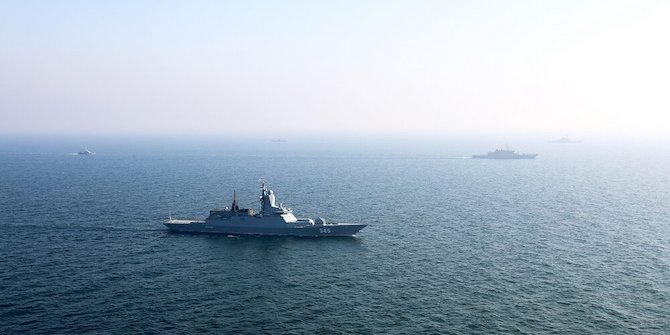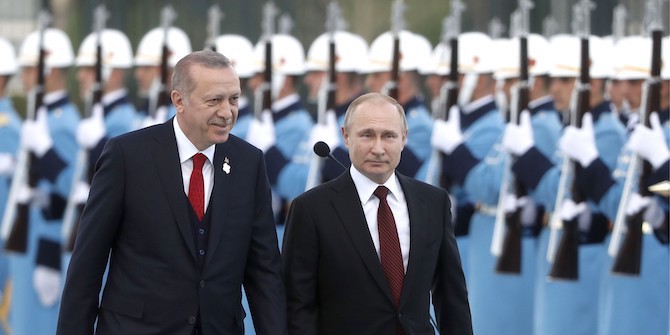by Nikolay Kozhanov

The Russian leadership’s efforts to promote ‘collective security’ for the Persian Gulf are nothing more but an attempt to keep up with current diplomatic trends. Indeed, a number of recent regional developments clearly demonstrated the international community’s serious desire to address political turmoil and help create more stability in the Middle East and North Africa (MENA) and, particularly, in the Gulf. Consequently, to maintain its influence in the Gulf, and not to fall behind other players, Moscow had to offer its own ideas for decreasing political tensions in the region.
After his visits to the GCC states and Iran in March–April 2021, Russian Foreign Minister Sergey Lavrov drew the international community’s attention to the ‘Concept of Collective Security in the Persian Gulf’ – a set of Russian initiatives promoted by the minister during his meetings with Middle Eastern officials. The concept’s core idea, which is to launch a multi-format dialogue between key regional players to discuss existing issues, is not something new. Since the late 1990s, and to varying extents over this period, the Kremlin has been promoting this concept at the international scale (usually recalling it during the periods of diplomatic crises, such as periodical exacerbations of tensions in Israeli-Palestinian relations, the 2003 US invasion of Iraq, the 2006 International Atomic Energy Agency report on Iran’s nuclear non-compliance to the United Nations Security Council, and others). Currently, Moscow tries to move slightly further; it talks about the necessity of applying its concept to the entire MENA region, in a format resembling the 1972–75 Helsinki process.
There are several reasons that explain the new appeal of Moscow’s long-standing initiative, in its particular focus on the Gulf. First, the Persian Gulf is significant for Moscow’s Middle East diplomacy, and particularly over the past five years. This is not surprising: both the GCC member states (especially Saudi Arabia, United Arab Emirates, Qatar) and Iran played an important role in ensuring the success of Moscow’s activities in the Middle East (including, but not limited to ones in Syria), as well as the achievement of broader foreign policy objectives that are relevant to the country’s economic development strategy and national security. However, this demands Moscow to maintain equally close relations with all Gulf states, which is not an easy task, considering the ongoing tensions between Iran and Saudi Arabia. Each side seeks Moscow’s support and reacts disapprovingly to both Russia’s neutrality or attempts to please the other’s opponent. As a result, the aforementioned collective security concept aims at achieving reconciliation between conflicting parties in the Gulf region, not only in order to elevate Russia’s role as a key global player in the eyes of the GCC and Iran, but also to reduce tensions in the region, and thus making it easier for Moscow to balance its relations with different states.
Secondly, as a global power, Russia is in decline. It is economically weak to a certain extent, and politically as well, which curtails its leverage and influence in the Middle East. Since 2019, diminishing resources and increasing domestic challenges make Russia less interested in engaging in new conflicts and risky undertakings in the Middle East. As a result, Moscow is again changing its foreign policy choices, shifting emphasis from costly and risky interventions (such as interference in Libyan affairs with the use of Russian mercenaries) to less risky, and most importantly, less costly diplomatic initiatives. Moreover, Moscow specifically formulates these initiatives while calling on the international community to implement them. This, in turn, removes Russia’s burden of being solely responsible for successes or failures, and instead allows it to share any costs with other participating countries.
Thirdly and most importantly, the active promotion of the security concept simply allows Moscow to stay in trend. Biden’s victory in the US presidential elections either coincided with or – more often – resulted in a number of conflict settlement processes in the region. This not only includes the Vienna talks on the fate of the Joint Comprehensive Plan of Action (JCPOA), but also talks between Iranian and Saudi officials to restore bilateral relations and address the political situation in Lebanon and Yemen. It also includes Qatari reconciliation with Saudi Arabia, the UAE, Bahrain and Egypt, as well as the resumption or improving of Saudi-Syrian relations. However, with the exception of the latter, Moscow’s role in these processes is either invisible or non-existent. Indeed, the beginning of the JCPOA talks in Vienna, or the recent round of Libyan national reconciliation, would not have gone ahead without Russian participation, but the key role is still attributed to the West and states within the region. Though the Kremlin constantly discussed the necessity of Saudi-Iranian or Saudi-Qatari dialogues, Moscow had nothing to do with them in practice. Under these circumstances, Russia’s Concept of Collective Security for the Persian Gulf is an attempt to demonstrate that Moscow has also something to say about the regional situation, thus, hoping to play an important and influential role in the new architecture of regional security and international relations. It wants to ensure that concepts promoted by the West or regional powers will not undermine Moscow’s interests.
However, the feasibility of Russia’s initiatives remains a key challenge. In its current format, the Concept of Collective Security for the Persian Gulf clearly does not appeal to Iran or the GCC (or anyone else). The document is both too shallow and complicated, while also not being precisely focused on the Gulf. In the attempt to create an appealing blueprint for the use of all players in the Middle East, Moscow made its concept too broad and general, covering a wide range of existing political issues in the Gulf and MENA. It also tried to take into account other countries’ interests. In the end, instead of a document acceptable to all or at least the majority, Moscow’s concept represents what can be called a ‘Russian salad of ideas’ – an eclectic mix of problems with little coherence or focus on practical steps to resolve them; the document touches on (without discussing in detail though) counter-terrorism, the supremacy of UN principles, the situation in Israel-Palestine, JCPOA, the crises in Iraq, Yemen and Syria, and even the idea of creating an equivalent to the Organization for Security and Co-operation in Europe (OSCE) for the Gulf. As a result, the main idea of the concept, which is the launch of a gradual and multi-format negotiation process in the Gulf and the MENA more broadly, is lost among a complex description of regional problems.
On the other hand, while trying to please everyone in this document, the Kremlin failed to win the hearts of anyone in the Gulf. Thus, for Iran, Russia’s attempts to involve non-regional players in the formation of a new security structure seems unacceptable and in many ways alarming. For the GCC countries, the formation of additional supranational structures with control over the use of force is definitely a source of concern insofar as it undermines their sovereignty.
The extent to which Moscow is able to guarantee and implement what it suggests is unclear – as is the region’s need for Russia in doing so. Indeed, multilevel and multilateral diplomatic efforts in pursuit for peaceful settlement of regional conflicts seem already underway without (or at best with the minimal participation of) Moscow. The regional distrust towards the Kremlin’s intentions is also strong among regional players (as demonstrated by the leak of the so-called Zarif tapes), as is their understanding of Russia’s weaknesses. As a result, in spite of the fact that the Concept of the Collective Security for the Persian Gulf and Helsinki process for the MENA are initiatives presented by pro-Kremlin experts as a new perspective and Russian strategy, these are just a set of ideas doomed for failure. Moreover, they represent nothing more but an evidence of the limited foreign policy tools that Moscow is able to use to project its power in the region.
This is part of a series on the challenges and opportunities facing the Russian-Iranian partnership in the Middle East, based on contributions from participants in a closed LSE workshop in April 2021. Read the introduction here, and see the other pieces below.
In this series:
- The Russian-Iranian Partnership in the Middle East: Challenges and Opportunities by Ghoncheh Tazmini
- Russia’s Middle East Policy and View of the Post-Cold War Global Order by Viacheslav Morozov
- Drivers of Russia’s Middle East Policy by Diana Galeeva
- Russia and Iran’s Relations in Iraq by Arman Mahmoudian
- Russia and Iran in Syria: Military Allies or Competitive Partners? by Samuel Ramani
- The Post-Blockade Gulf: Prospects for Relations with Iran? The Russian Role by Courtney Freer
- Russia’s Role in Brokering a Comprehensive Agreement between the United States and Iran by Hamidreza Azizi
- Russia and the Issue of a New Security Architecture for the Persian Gulf by Nikolay Kozhanov







4 Comments